#reenvision
Video
undefined
tumblr
I finally made the feature that this game is named after-
SO. In this game, you have a meter called your “desperation”. It’s the blue bar in the video and that meter is constantly creeping up in almost every battle you get into. Once it hits a certain threshold, the amount of damage you take multiplies. HOWEVER, the amount of damage you dish out ALSO multiplies.

Once the desperation meter maxes out, you take 4x the damage you normally would (so if a slime were to hit you and only deal 10 damage normally, you’ll now take 40 instead). The trade-off is that you also dish out 4x the damage... AND you can “reenvision” things.
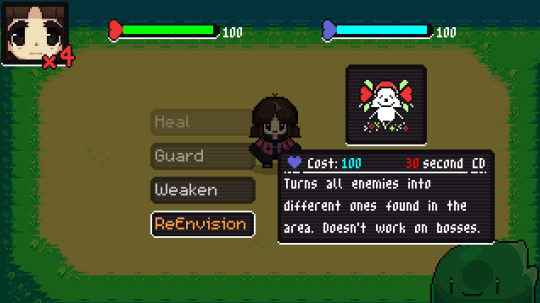
When you reenvision, you can change things into something else. In this video, I changed the funny slime lad into a plant monster and back!
The biggest challenge of this game’s battle system is meant to be managing your desperation. The higher your desperation is, the more damage you do and the more special moves you can use (because those are also despair dependent), BUT the more damage you take. Which means you have to be on your A-game with your dodging skills.

Oh yeah... I should probably mention that you only have 100 max HP throughout the entire game, and enemies can hit hard. So be careful out there!
#indiegame#indiegames#solodev#gamedev#indierpg#pixel art#rpg#rpg game#infodump#game#the undiagnosed ADHD is shining through today#also last time i posted about this game on this account was in april#the improvement between the posts is NIIICE#story driven rpg#story driven#ReEnvision#ReEnvision game#screenshot#screenshotsaturday
12 notes
·
View notes
Text
End of the Year!
The year is coming to a close and ReEnvision’s development is at the 9 month mark!
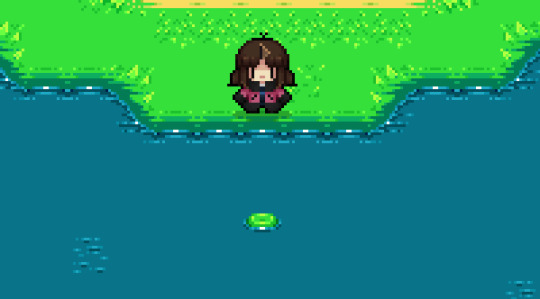
I first had the concept for this goofy game waaay back in 2019, started writing it in late 2020, and only this year am I finally making the effort to make it a reality. It hasn’t even been a full 365 days since starting this project and yet so much has already changed.
SO, why not take a little trip through memory lane to end off the year?
A then vs now menu comparison!

And here’s what the old item menu inside a battle used to look like, horrid placeholders and all.

Speaking of battles, those looked pretty goofy, too...

The sprites weren’t spared either!

Or the portraits...

Or even the basic scenery.

Looking through everything, I think it’s been a pretty productive year so far! March 1st will mark the day this game’s development officially reaches the 1 year mark. Let’s see how much more I can accomplish by then. >:D
Main goals for next year are to finish up the game’s storyline, start working on the script, finish up implementing the game’s core mechanics, and then start figuring out how to go about things like story progression! As well as polishing what I have so far, and adding some more enemies. If I’m really ahead of the game, maybe I can even start making a few locations that would actually appear in the final game? Who knows!
#reenvision game#indie game#pixel art#indie rpg#indie dev#game dev#video game#reenvision#long post#the older version of the game also had a much larger screen size#the screen size had to change though#the old size was incompatible for most devices in fullscreen mode#INCLUDING my own!#so i had to reduce the size#this is why every character has a new sprite#this is also why the tileset changed way earlier than i initially wanted it to#everything was too big on the new screen size!#and it bothered me too much lol
8 notes
·
View notes
Text
I'm like knees deep into my Danganronpa hyperfixation again and. grrrrr all the maggots in my brain rn
#I've been writing a lot in between school and everything so I might share little snippets of ideas and whatnot#Maybe#A lot of it is reenvisioning plot points and character developments that happen within the series#But like 99% of it is for the anime cause..... yeesh#I feel bad cause all of my friends are having to listen to me vomit about DR like everyday and I'm just. I'm so sorry LMAOOO#I can't help it that whenever I close my eyes to go to sleep I see Nagito Komaeda#He's like my little sleep paralysis demon
7 notes
·
View notes
Text
god. source redacted for 'letting the person it was originally inflicted on live peacefully' reasons but i can't stop thinking abt the assertion i saw earlier that "SFF is supposed to be based in an understanding of the natural world"??
like. speculative fiction is literally for speculating in! hence the name! like i do probably in general agree that things you aren't deliberately changing shouldn't be jarringly different than our existing reality for no reason (although like. 'it fits the flavor of the new world i'm creating' is sufficient reason!), but. actually going 'what if things were meaningfully different in X way' is a foundational principle of the genre and not something to ~rebut~ by going 'actually in reality they're Y though'???
#also like. cf el's post from the other day abt the issues with 'natural'#like just. the irony of bringing up 'natural' on a post that was literally abt reenvisioning what we understand to be 'natural'...#anyway.#bookblogging#sry 2 obliqueblog i'm just still marvelling at the absurdity#learn! yr! genres! before! talking! shit (that's in fact nonsense)!
14 notes
·
View notes
Text
#i am unhinged and totally reenvisioning the interior of my apartment#please enjoy this and vote if you wanna
0 notes
Text
Delgato's Reenvision

https://www.patreon.com/posts/delgato-family-94095280?utm_medium=clipboard_copy&utm_source=copyLink&utm_campaign=postshare_creator&utm_content=join_link
0 notes
Text
"If someone asked me at the end, I'll tell them put me back in it. Darling, I would do it again, If I could hold you for a minute, I'd go through it again.. I would still be surprised I could find you, in any life. I would not change it each time.." Francesca, Andrew Hozier-Byrne
Inspired reenvisioning of mediasedits edit
407 notes
·
View notes
Text






Cosplay couture Kazuhira Miller
Photography by Vespa Photography
Costume by Courtney Coulson
Despite Miller’s limited wardrobe and static body language, I find him endlessly inspiring. The challenge of portraying him through cosplay, and reenvisioning him through fashion is all about subtlety and the little details. I kept the silhouette functionally the same, but draping the trenchcoat like a cape to entirely obscure his missing arm added a touch of theatre. Essentially I built everything around the velvet double breasted blazer, it read to me as the formal fashion equivalent of his military uniform.
Most of this costume was assembled, the most work I did was cut the wig myself. I’m surprised what I could get out of a $15 eBay wig, it’s a half-wig too, it needed to be thin enough to fit under the beret. The downside is I could only cut it so short, but I think this length works for what I’m going for.
145 notes
·
View notes
Text
In the modern era, artists continued to reenvision Charlemagne. In the 1700s, an era that saw renewed veneration of the Roman Empire, artists depicted him in more ancient garb, as in this statue from the Vatican:

This drawing by Julius Schnorr von Carolsfeld also imagines Charlemagne being crowned by the pope, amidst a bunch of people dressed like ancient Romans:

See more here:
{WHF} {Ko-Fi} {Medium}
115 notes
·
View notes
Photo

Duke Riley’s Poly S. Tyrene Memorial Maritime Museum series, reenvisions the traditional maritime craft of scrimshaw through the use of bottles, containers, and other found plastic beach trash.
The work shown here—with an iconic symbol reimagined—is displayed in a case with 15 other objects depicting New York landmarks.
This series is part of 250 other new and recent works of Riley’s are on view through April 23, 2023.
📷 Installation view, DEATH TO THE LIVING, Long Live Trash. Brooklyn Museum, June 17, 2022 - April 23, 2023. (Photo: Danny Perez, Brooklyn Museum)
#Brooklyn Museum#brooklyn#museum#art#exhibition#scrimshaw#maritime art#Duke Riley#DukeRileyBkM#nyc#new york city
413 notes
·
View notes
Video
undefined
tumblr
SO! The past few weeks, I’ve been working on a cutscene system. Just today, I finished up the bulk of it and I managed to make the short little scene above!
(note: this scene won’t be in the final game, it’s purely for testing)
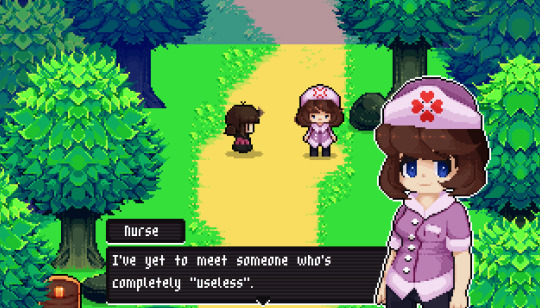
It’s simple and still has areas of improvement, but I’m so excited with how things are shaping up. A good friend of mine is helping to review the story to make sure things flow correctly, and that’s going well so far. Speaking of which, opening the game’s main design and storyboard document lags my entire computer because it’s at 277 pages and it’ll only continue to grow. I also refuse to make a new document-
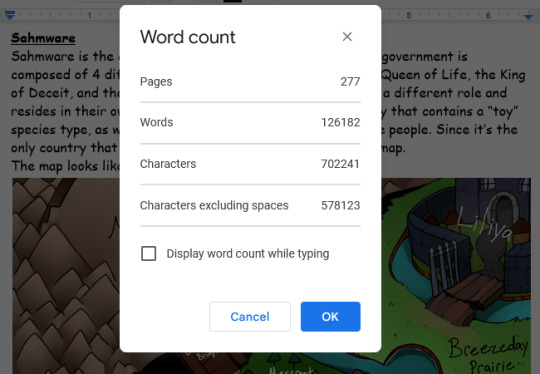
Aside from my poor document management skills, my pixel art abilities are improving, the main foundations of the game are all mostly in... Development is going well!
#indie game#indie dev#indie rpg#video game#pixel art#indie developer#game developer#pixel art game#solo developer#WIP#game progress#in progress#pixel graphics#game#screenshot#game screenshot#ReEnvision#ReEnvision game#making progress on this make is the highlight of any day of mine#especially with the garbage the art community has been putting up with lately#also what's with the increase of bots???#i swear i got 5 bot followers in total the past week#just a year ago i didn't even see ONE#now they're everywhere
9 notes
·
View notes
Text
A bit about the Inn + Other news

Been in the grind zone once again for some weeks, and good news: We’re finally moving on from Liza purgatory! In exchange, we’re now in the Inn Pit.
It’s been another few weeks since my last post on just about any of my socials, but on my Twitter, I showed a small little clip of Liza’s boss fight. It’s not much of a looker (yet), but man oh man was it working! It’s still not very flashy (I’m not worrying about overly flashy visuals and effects until towards the end of development), BUUUUT I can say that since that last post, it’s done!
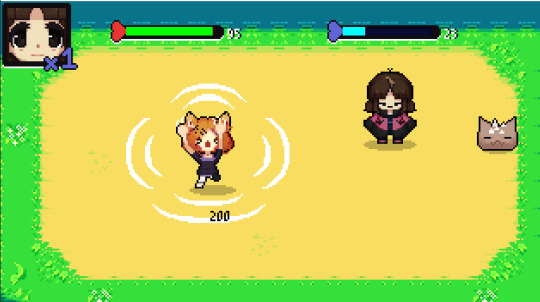
All of Liza’s possible moves have been implemented and I’ve even added a few little neat things. For example, on certain frames of some of Liza’s attacks, you can hit her and her attack will instantly be interrupted, meaning you can basically cancel the attack completely. Although the “reenvision” mechanic doesn’t work on bosses, you can still use it to instantly end Liza’s current attack and reset her position in the arena (so if she’s cornering you, you can reenvision her and both you and Liza will be reset to the positions you started the boss fight in!)
There’s more things like that I’d love to add to not just Liza, but future bosses as well. This game does not have a level system and depends entirely on player skill. While this is turning out to be quite the challenge in figuring out how to give the player the feeeeeeling of gameplay progression, it also opens the doors for quite a number of cool little tricks like this. Letting the player be in complete control of battles like this as long as they know exactly about their opponents... There’s so much potential with this, it’s a little crazy!
ENOUGH about Liza though, she’s been the center of attention for long enough. Let’s talk art. Let’s talk about Clemence Inn!

SO. THE INN! I mentioned it vaguely at the end of my last post (and “promised” to post more about it the week after... Aha) but Clemence Inn is the name of the main location of the game. It’s a rundown inn in the middle of a small, sleepy town named Clemence. It has a total of 4 staff members: the mayor, a janitor, the town’s bounty hunter, and the Nurse. I’ve shown off the Nurse frequently in the past, so the other 3 will be new characters I’ll show off in time! The Inn is also where you, the player, will live. As the inn comes together and I fill out more rooms (the pictures above and below are only of the inn’s lobby area), maybe I’ll give a bit more of a proper room tour! As well as give a proper introduction the wonderful Inn staff. Who knows? 😳

With the foundation of the game done and Liza + the store system as a whole also being done, my focus will be shifting to some other very important, yet not as “exciting” things to show off. Basically, I’ll be focusing on game locations, art direction (for said locations), more monsters, more enemies, writing and finishing the script, more smaller things I’ve been putting on the backburner ingame (such as some smaller features and tweaks I’ve been meaning to get to). All of this is very important to the game and uh... Well, it’s literally the rest of the game. However, it’s not as “exciting” to show off as it slowly comes along. I’ll continue to show off these WIPs nevertheless (I love blathering about this game, and I’m sure there’s some who love hearing about games in active development), but if things start to feel a weeee bit like a slog, then it’s because it is! Everything will come together with time though. We’re only in year 2 of development, and I suspect this game will take 4-5 years at least.
To end off this long update post, I’ve also been working on newer, more “finalized” tilesets for the game. That’s right, plot twist: The tilesets currently ingame were always just temporary. I had changed the screen size of the game (384x216 to 320x180) a year ago and surprise surprise, big pixel art assets do not scale down very well! I needed new tilesets, but wanted to take is as an opportunity to practice :P
The new tilesets aren’t that different, but I made sure to make the colors easier on the eyes. Here’s the new (top) vs old (bottom) "main” forest tiles!


10 notes
·
View notes
Note
Ask game! Would you ever...write another fic inspired by Shakespeare? (I still think about Sigh No More in my spare time - but the hypothetical future fic doesn't need to be ATLA or Maiko.)
im dying laughing bc i had just sent in my ask to you when this arrived, and while mine was not identical, it has a similar classical essence 😂
ANYWAYS thank you for the ask my beloved!! i wouldn't put it completely out of the picture, bc i Love shakespeare, but i've actually been working on a short story collection specifically about reenvisioning and transmogrifying the stories of forgotten/misunderstood characters from the classical canon (which includes a lot of shax), so more of my shakespeare writing energy has been focused into those works as opposed to fanfic aus.
HOWEVER. something something zukaang doomed lovers romeo and juliet-esque au??? do you see the vision!!
#(my short story collection so far consists of stories about ophelia; sycorax; lucy; and ismene)#(I WILL ACCEPT ANY EXCUSE TO SAY MORE)#thank you again for the ask 💛#amy answers#justoceanmyth#based on my response im assuming you can see my inspo for the question i sent you 😂
12 notes
·
View notes
Text
By: Edward Schlosser
Published: Jun 3, 2015
I’m a professor at a midsize state school. I have been teaching college classes for nine years now. I have won (minor) teaching awards, studied pedagogy extensively, and almost always score highly on my student evaluations. I am not a world-class teacher by any means, but I am conscientious; I attempt to put teaching ahead of research, and I take a healthy emotional stake in the well-being and growth of my students.
Things have changed since I started teaching. The vibe is different. I wish there were a less blunt way to put this, but my students sometimes scare me — particularly the liberal ones.
Not, like, in a person-by-person sense, but students in general. The student-teacher dynamic has been reenvisioned along a line that’s simultaneously consumerist and hyper-protective, giving each and every student the ability to claim Grievous Harm in nearly any circumstance, after any affront, and a teacher’s formal ability to respond to these claims is limited at best.
What it was like before
In early 2009, I was an adjunct, teaching a freshman-level writing course at a community college. Discussing infographics and data visualization, we watched a flash animation describing how Wall Street’s recklessness had destroyed the economy.
The video stopped, and I asked whether the students thought it was effective. An older student raised his hand.
”What about Fannie and Freddie?” he asked. “Government kept giving homes to black people, to help out black people, white people didn’t get anything, and then they couldn’t pay for them. What about that?”
I gave a quick response about how most experts would disagree with that assumption, that it was actually an oversimplification, and pretty dishonest, and isn’t it good that someone made the video we just watched to try to clear things up? And, hey, let’s talk about whether that was effective, okay? If you don’t think it was, how could it have been?
The rest of the discussion went on as usual.
The next week, I got called into my director’s office. I was shown an email, sender name redacted, alleging that I “possessed communistical [sic] sympathies and refused to tell more than one side of the story.” The story in question wasn’t described, but I suspect it had do to with whether or not the economic collapse was caused by poor black people.
My director rolled her eyes. She knew the complaint was silly bullshit. I wrote up a short description of the past week’s class work, noting that we had looked at several examples of effective writing in various media and that I always made a good faith effort to include conservative narratives along with the liberal ones.
Along with a carbon-copy form, my description was placed into a file that may or may not have existed. Then ... nothing. It disappeared forever; no one cared about it beyond their contractual duties to document student concerns. I never heard another word of it again.
That was the first, and so far only, formal complaint a student has ever filed against me.
Now boat-rocking isn’t just dangerous — it’s suicidal
This isn’t an accident: I have intentionally adjusted my teaching materials as the political winds have shifted. (I also make sure all my remotely offensive or challenging opinions, such as this article, are expressed either anonymously or pseudonymously). Most of my colleagues who still have jobs have done the same. We’ve seen bad things happen to too many good teachers — adjuncts getting axed because their evaluations dipped below a 3.0, grad students being removed from classes after a single student complaint, and so on.
I once saw an adjunct not get his contract renewed after students complained that he exposed them to “offensive” texts written by Edward Said and Mark Twain. His response, that the texts were meant to be a little upsetting, only fueled the students’ ire and sealed his fate. That was enough to get me to comb through my syllabi and cut out anything I could see upsetting a coddled undergrad, texts ranging from Upton Sinclair to Maureen Tkacik — and I wasn’t the only one who made adjustments, either.
I am frightened sometimes by the thought that a student would complain again like he did in 2009. Only this time it would be a student accusing me not of saying something too ideologically extreme — be it communism or racism or whatever — but of not being sensitive enough toward his feelings, of some simple act of indelicacy that’s considered tantamount to physical assault. As Northwestern University professor Laura Kipnis writes, “Emotional discomfort is [now] regarded as equivalent to material injury, and all injuries have to be remediated.” Hurting a student’s feelings, even in the course of instruction that is absolutely appropriate and respectful, can now get a teacher into serious trouble.
In 2009, the subject of my student’s complaint was my supposed ideology. I was communistical, the student felt, and everyone knows that communisticism is wrong. That was, at best, a debatable assertion. And as I was allowed to rebut it, the complaint was dismissed with prejudice. I didn’t hesitate to reuse that same video in later semesters, and the student’s complaint had no impact on my performance evaluations.
In 2015, such a complaint would not be delivered in such a fashion. Instead of focusing on the rightness or wrongness (or even acceptability) of the materials we reviewed in class, the complaint would center solely on how my teaching affected the student’s emotional state. As I cannot speak to the emotions of my students, I could not mount a defense about the acceptability of my instruction. And if I responded in any way other than apologizing and changing the materials we reviewed in class, professional consequences would likely follow.
I wrote about this fear on my blog, and while the response was mostly positive, some liberals called me paranoid, or expressed doubt about why any teacher would nix the particular texts I listed. I guarantee you that these people do not work in higher education, or if they do they are at least two decades removed from the job search. The academic job market is brutal. Teachers who are not tenured or tenure-track faculty members have no right to due process before being dismissed, and there’s a mile-long line of applicants eager to take their place. And as writer and academic Freddie DeBoer writes, they don’t even have to be formally fired — they can just not get rehired. In this type of environment, boat-rocking isn’t just dangerous, it’s suicidal, and so teachers limit their lessons to things they know won’t upset anybody.
The real problem: a simplistic, unworkable, and ultimately stifling conception of social justice
This shift in student-teacher dynamic placed many of the traditional goals of higher education — such as having students challenge their beliefs — off limits. While I used to pride myself on getting students to question themselves and engage with difficult concepts and texts, I now hesitate. What if this hurts my evaluations and I don’t get tenure? How many complaints will it take before chairs and administrators begin to worry that I’m not giving our customers — er, students, pardon me — the positive experience they’re paying for? Ten? Half a dozen? Two or three?
This phenomenon has been widely discussed as of late, mostly as a means of deriding political, economic, or cultural forces writers don’t much care for. Commentators on the left and right have recently criticized the sensitivity and paranoia of today’s college students. They worry about the stifling of free speech, the implementation of unenforceable conduct codes, and a general hostility against opinions and viewpoints that could cause students so much as a hint of discomfort.
I agree with some of these analyses more than others, but they all tend to be too simplistic. The current student-teacher dynamic has been shaped by a large confluence of factors, and perhaps the most important of these is the manner in which cultural studies and social justice writers have comported themselves in popular media. I have a great deal of respect for both of these fields, but their manifestations online, their desire to democratize complex fields of study by making them as digestible as a TGIF sitcom, has led to adoption of a totalizing, simplistic, unworkable, and ultimately stifling conception of social justice. The simplicity and absolutism of this conception has combined with the precarity of academic jobs to create higher ed’s current climate of fear, a heavily policed discourse of semantic sensitivity in which safety and comfort have become the ends and the means of the college experience.
This new understanding of social justice politics resembles what University of Pennsylvania political science professor Adolph Reed Jr. calls a politics of personal testimony, in which the feelings of individuals are the primary or even exclusive means through which social issues are understood and discussed. Reed derides this sort of political approach as essentially being a non-politics, a discourse that “is focused much more on taxonomy than politics [which] emphasizes the names by which we should call some strains of inequality [ ... ] over specifying the mechanisms that produce them or even the steps that can be taken to combat them.” Under such a conception, people become more concerned with signaling goodness, usually through semantics and empty gestures, than with actually working to effect change.
Herein lies the folly of oversimplified identity politics: while identity concerns obviously warrant analysis, focusing on them too exclusively draws our attention so far inward that none of our analyses can lead to action. Rebecca Reilly Cooper, a political philosopher at the University of Warwick, worries about the effectiveness of a politics in which “particular experiences can never legitimately speak for any one other than ourselves, and personal narrative and testimony are elevated to such a degree that there can be no objective standpoint from which to examine their veracity.” Personal experience and feelings aren’t just a salient touchstone of contemporary identity politics; they are the entirety of these politics. In such an environment, it’s no wonder that students are so prone to elevate minor slights to protestable offenses.
(It’s also why seemingly piddling matters of cultural consumption warrant much more emotional outrage than concerns with larger material implications. Compare the number of web articles surrounding the supposed problematic aspects of the newest Avengers movie with those complaining about, say, the piecemeal dismantling of abortion rights. The former outnumber the latter considerably, and their rhetoric is typically much more impassioned and inflated. I’d discuss this in my classes — if I weren’t too scared to talk about abortion.)
The press for actionability, or even for comprehensive analyses that go beyond personal testimony, is hereby considered redundant, since all we need to do to fix the world’s problems is adjust the feelings attached to them and open up the floor for various identity groups to have their say. All the old, enlightened means of discussion and analysis —from due process to scientific method — are dismissed as being blind to emotional concerns and therefore unfairly skewed toward the interest of straight white males. All that matters is that people are allowed to speak, that their narratives are accepted without question, and that the bad feelings go away.
So it’s not just that students refuse to countenance uncomfortable ideas — they refuse to engage them, period. Engagement is considered unnecessary, as the immediate, emotional reactions of students contain all the analysis and judgment that sensitive issues demand. As Judith Shulevitz wrote in the New York Times, these refusals can shut down discussion in genuinely contentious areas, such as when Oxford canceled an abortion debate. More often, they affect surprisingly minor matters, as when Hampshire College disinvited an Afrobeat band because their lineup had too many white people in it.
When feelings become more important than issues
At the very least, there’s debate to be had in these areas. Ideally, pro-choice students would be comfortable enough in the strength of their arguments to subject them to discussion, and a conversation about a band’s supposed cultural appropriation could take place alongside a performance. But these cancellations and disinvitations are framed in terms of feelings, not issues. The abortion debate was canceled because it would have imperiled the “welfare and safety of our students.” The Afrofunk band’s presence would not have been “safe and healthy.” No one can rebut feelings, and so the only thing left to do is shut down the things that cause distress — no argument, no discussion, just hit the mute button and pretend eliminating discomfort is the same as effecting actual change.
In a New York Magazine piece, Jonathan Chait described the chilling effect this type of discourse has upon classrooms. Chait’s piece generated seismic backlash, and while I disagree with much of his diagnosis, I have to admit he does a decent job of describing the symptoms. He cites an anonymous professor who says that “she and her fellow faculty members are terrified of facing accusations of triggering trauma.” Internet liberals pooh-poohed this comment, likening the professor to one of Tom Friedman’s imaginary cab drivers. But I’ve seen what’s being described here. I’ve lived it. It’s real, and it affects liberal, socially conscious teachers much more than conservative ones.
If we wish to remove this fear, and to adopt a politics that can lead to more substantial change, we need to adjust our discourse. Ideally, we can have a conversation that is conscious of the role of identity issues and confident of the ideas that emanate from the people who embody those identities. It would call out and criticize unfair, arbitrary, or otherwise stifling discursive boundaries, but avoid falling into pettiness or nihilism. It wouldn’t be moderate, necessarily, but it would be deliberate. It would require effort.
In the start of his piece, Chait hypothetically asks if “the offensiveness of an idea [can] be determined objectively, or only by recourse to the identity of the person taking offense.” Here, he’s getting at the concerns addressed by Reed and Reilly-Cooper, the worry that we’ve turned our analysis so completely inward that our judgment of a person’s speech hinges more upon their identity signifiers than on their ideas.
A sensible response to Chait’s question would be that this is a false binary, and that ideas can and should be judged both by the strength of their logic and by the cultural weight afforded to their speaker’s identity. Chait appears to believe only the former, and that’s kind of ridiculous. Of course someone’s social standing affects whether their ideas are considered offensive, or righteous, or even worth listening to. How can you think otherwise?
We destroy ourselves when identity becomes our sole focus
Feminists and anti-racists recognize that identity does matter. This is indisputable. If we subscribe to the belief that ideas can be judged within a vacuum, uninfluenced by the social weight of their proponents, we perpetuate a system in which arbitrary markers like race and gender influence the perceived correctness of ideas. We can’t overcome prejudice by pretending it doesn’t exist. Focusing on identity allows us to interrogate the process through which white males have their opinions taken at face value, while women, people of color, and non-normatively gendered people struggle to have their voices heard.
But we also destroy ourselves when identity becomes our sole focus. Consider a tweet I linked to (which has since been removed. See editor’s note below.), from a critic and artist, in which she writes: “When ppl go off on evo psych, its always some shady colonizer white man theory that ignores nonwhite human history. but ‘science’. Ok ... Most ‘scientific thought’ as u know it isnt that scientific but shaped by white patriarchal bias of ppl who claimed authority on it.”
This critic is intelligent. Her voice is important. She realizes, correctly, that evolutionary psychology is flawed, and that science has often been misused to legitimize racist and sexist beliefs. But why draw that out to questioning most “scientific thought”? Can’t we see how distancing that is to people who don’t already agree with us? And tactically, can’t we see how shortsighted it is to be skeptical of a respected manner of inquiry just because it’s associated with white males?
This sort of perspective is not confined to Twitter and the comments sections of liberal blogs. It was born in the more nihilistic corners of academic theory, and its manifestations on social media have severe real-world implications. In another instance, two female professors of library science publicly outed and shamed a male colleague they accused of being creepy at conferences, going so far as to openly celebrate the prospect of ruining his career. I don’t doubt that some men are creepy at conferences — they are. And for all I know, this guy might be an A-level creep. But part of the female professors’ shtick was the strong insistence that harassment victims should never be asked for proof, that an enunciation of an accusation is all it should ever take to secure a guilty verdict. The identity of the victims overrides the identity of the harasser, and that’s all the proof they need.
This is terrifying. No one will ever accept that. And if that becomes a salient part of liberal politics, liberals are going to suffer tremendous electoral defeat.
Debate and discussion would ideally temper this identity-based discourse, make it more usable and less scary to outsiders. Teachers and academics are the best candidates to foster this discussion, but most of us are too scared and economically disempowered to say anything. Right now, there’s nothing much to do other than sit on our hands and wait for the ascension of conservative political backlash — hop into the echo chamber, pile invective upon the next person or company who says something vaguely insensitive, insulate ourselves further and further from any concerns that might resonate outside of our own little corner of Twitter.
--
youtube
==
This has been going on for over a decade. The correct response is to mock and laugh at the people complaining, and point out that they're not ready for the big wide world outside their kindergarten mindset, so they'd be better off going back home to mommy and daddy. Not validate and endorse their feelings. We need to get back to that.
#Edward Schlosser#trigger warnings#hypersensitivity#Christina Hoff Sommers#safe space#academic corruption#higher education#religion is a mental illness
7 notes
·
View notes
Text
Part 2. Lottie needs reassurance after starting up her Wellness Center (NSFW)

SUBMISSION: Hiya! Can you please write the second part for your new Lottie fic? It was so good! Maybe where Lottie feels that everybody is using her for something and she is not worth anything, so her girlfriend reassures her by worshipping and pleasuring? Can you please include where female reader goes on her knees infront of Lottie, and then Lottie comes several times on Y/N's face that is all now covered in Lottie?
Lottie was always a powerful presence. Even in childhood, her emotions set the tone for the room. She had a great deal of sway over the people around her. You figured this was why what had transpired in the wilderness was able to take place. You were always so taken by Lottie, and a sick part of you in 1996 was pleased to see that the rest of your team was taken with her too.
After her time in Switzerland, you brought her back to health and she reenvisioned her potential. She put down a deposit on a massive plot of land upstate and began building her newest, and greatest project.
When it came to fruition, it didn't take long for people to flock to her. You liked seeing the light come back to her as she took back her power that had been drained from her. Of course, you stayed alongside her. It was Lottie's project and not yours, but you lived on the grounds and often found yourself in her bed.
Whether or not you were in a relationship depended on who you asked. Your love for Lottie often veered into obsession. She returned that same feeling for you, and you were frequently intimate but nothing had been made official.
You were in Lottie's bedroom this night. She was looking at herself in the mirror, rubbing her temples. You laid on the bed, watching her carefully.
"It seems like everyone wants something from me." She said quietly. "Needs something from me."
"You're their teacher." You responded. "Of course they need you."
She found you through the reflection of the mirror and locked eyes with the illusion of yours. "What if I don't have what it takes to give it to them?"
"You have never had to find the power to help people, Lottie. You just have it. It's in your soul."
She shook her head. "That can't be right."
"Do I need to prove it to you?" You asked sweetly.
She smiled, the seriousness that once flooded her face vanished. "How do you suppose you're going to do that?"
"Come here." You demanded as you took to your feet.
She made her way to you and you finally made proper eye-contact. With a sly smile you began disrobing her very slowly. She immediately allowed you to do what you wanted with her. Off came her tunic and leggings, leaving her in her underwear. Lottie seldom wore bras. You brought her closer to you and brought her back to the mirror. You ran your fingertips along a scar on her stomach from the day Shauna nearly beat her to death.
"Do you see how fucking beautiful you are?" You whispered into her neck, littering it with sweet kisses.
Your hands rested on the hem of her panties. You tugged them down and they fell to her ankles, leaving her dark bush exposed.
"You make me weak." You sputtered.
"You've always been stronger than me." She said before turning around to face you. She began unbuttoning your shirt, unbuckling your belt, tugging on the zipper to your pants.
You let her disrobe you as she pleased. "I'm only strong when I'm with you." You responded.
Something in her face changed then, an eyebrow raised and she pushed her hair behind her ears.
You sat her down at the foot of the bed and got on your knees. "You've always been like a god to me." You rasped, resting your head on her thigh.
She ran her fingers over your hair, gently tugging on it. "Where does all of that come from do you think?"
"Maybe it's just because I've always been rather in lust over you." You whispered. "But you wield such feminine power." Your lips trailed along her cunt which was now slick.
You could hear a beating heart in your ears but it wasn't yours. It was Lottie's. She grabbed the nape of your neck and guided you further in.
Her scent was always so earthy and grounding. It made you crazy. The taste of you was stronger than any drug you'd ever tried and you'd tried many. You indulged, swiping your tongue along her slit and gliding around her clit. She let out a moan and gripped you tightly.
She lifted herself up on her feet, and you stretched your back to reach her from your position on the floor. You continued to eat her out, spending time worshiping her clit. Her heart pounded and pounded and so did your tongue, flicking up and down, dancing around her hole.
"Show me, baby." She groaned, pulling your hair now. "Show me how powerful my pussy is."
You lifted your dominant hand to her thighs, parting them slightly, lowering her closer to you. You entered two fingers inside her and fucked her hard.
She yelped, her face reaching up to the sky and her jaw slack. "Oh my god."
"You're my god." You said proudly, fucking her harder.
Her cunt tightened around you, clenching your fingers together tight.
"Make me come, then." She sputtered.
With your hand inside her, you lifted your mouth to her clit. She was so wet and your face was getting absolutely drenched. Finally you could feel her contract against you. Her cunt always gave her away before her mouth did.
Then she screamed. She let out such a beautiful yell as her cum streamed down your hand, and landed all over your face. A delicious offering for your work. She wasn't done though, you could feel her coming against you repeatedly and you soaked up what she had to give you.
When she was finished, the pounding in your ears had ceased and you slowly slid out of her. Her grip on you loosened. She tilted your chin up to see your face wet with her cum.
"You're so beautiful when you're covered in me."
A few tears escaped your eyes, which she quickly swiped away. "I love you, Lottie."
"I know." She remarked.
You wrapped your arms around her legs and rested your head against her stomach.
40 notes
·
View notes
Text
Bailey-Moon Reenvision
#sims#sims 4#the sims community#townie makeover#thorne bailey#octavia moon#del sol valley#Reenvision Townies#my sims
1 note
·
View note